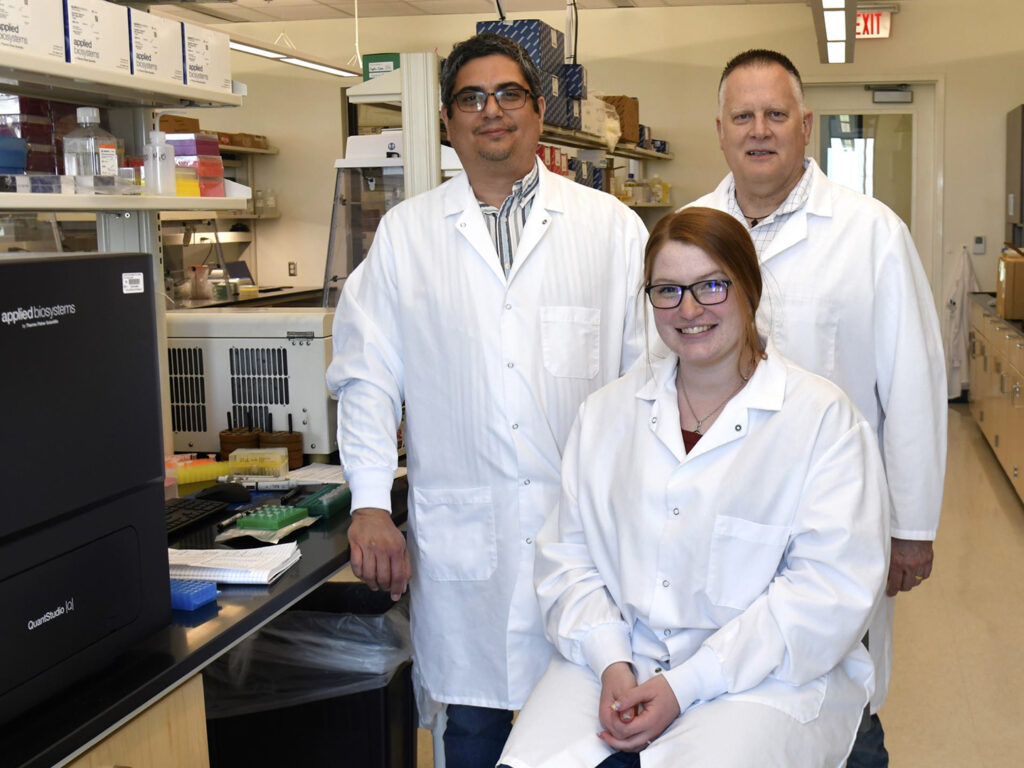Texas A&M Students Selected For ‘One Health’-Focused Veterinary Research Fellowships
Story by Courtney Price, VMBS Communications

Two Texas A&M University veterinary students were among the 13 students from around the world to be selected for Veterinary Student Research Fellowships issued by the Foundation for Food & Agriculture Research (FFAR) and the American Association of Veterinary Medical Colleges (AAVMC).
Ali Olsen-Gerlach and Madison Rowe were among those selected for the 2023 FFAR Vet Fellows program, which was developed to address the global need for research that tackles how population growth, climate change, emerging infectious diseases, and antimicrobial resistance threaten sustainable livestock production. The awarding organizations seek to promote veterinary training that includes multi-species medicine, animal science, and public health.
Since funding opportunities for veterinary student research are rare, the three-month summer fellowship provides an experience not offered in many other places. Fellows receive access to mentorship and hands-on research experience as well as scientific communication and critical review of primary scientific literature through Texas A&M’s summer Veterinary Medical Scientist Research Training Program.
Olsen-Gerlach, a second-year veterinary student in the School of Veterinary Medicine & Biomedical Sciences (VMBS), is conducting research with Drs. Robert Valeris-Chacin and Paul Morley, faculty at the VMBS’ Veterinary Education, Research, & Outreach (VERO) program in Canyon.
Olsen-Gerlach studies Bovine Respiratory Disease (BRD), which is the most common illness in beef cattle and a major problem for the industry that requires treatment with antibiotics.
Her research evaluates how commonly used antibiotics impact bacteria in healthy cattle — beyond preventing BRD — to provide producers with new information that can increase their antibiotic stewardship efforts.
“Ali has been a great contributor in the VERO lab this summer, where she worked hard on her assigned research as well as helping with other projects being conducted by our team,” Morley said. “We are hoping that she is able to continue as part of our research team after this project is completed.”
Rowe, a second-year veterinary student, is conducting research with Dr. Juliana Rangel, associate professor of apiculture in the Texas A&M College of Agriculture and Life Sciences’ Department of Entomology, on infections in honey bees, which are often overlooked in veterinary agricultural research.
Rowe studies the behavioral and reproductive effects of a gastrointestinal fungus, Nosema ceranae, in honey bee queens and workers to determine the big-picture impacts of Nosema infection on colony health.
Rowe’s research will inform future treatments and supportive care for the disease caused by Nosema (known as “nosemosis”), as well as trace potential production and survivorship impacts that can often lead to colony collapse.
###
For more information about the Texas A&M School of Veterinary Medicine & Biomedical Sciences, please visit our website at vetmed.tamu.edu or join us on Facebook, Instagram, and Twitter.
Contact Information: Jennifer Gauntt, Director of VMBS Communications, Texas A&M School of Veterinary Medicine & Biomedical Sciences, jgauntt@cvm.tamu.edu, 979-862-4216


